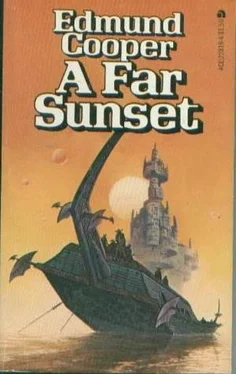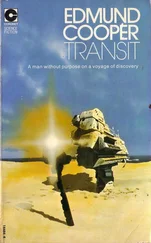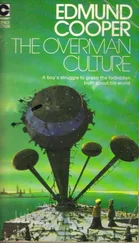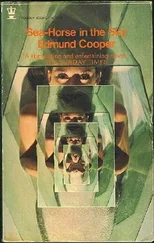What was that Bayani proverb? He who is alive cannot die. Paul Marlowe laughed. God damn Oruri! Then he laughed again as he realized that he had only called on one god to confound another.
Because of his sadness he had wanted solitude. So he had left the small house and Mylai Tui and had wandered slowly along the bank of the Canal of Life until he came to where the kappa fields met the heavy green perimeter of the forest. And now he was sitting on a small mound, watching the women toiling in the muddy fields as they tended the new crop.
They were singing. The words came to him faintly, intermittendy across the indecisive gusts of wind…
‘A little kappa, a little love.
Oruri listens, waiting above.
A little kappa, a little light.
Oruri brings the gift of night.
A little kappa, a little song.
The day is short, the night is long.’
Yes, thought Paul savagely, God damn Oruri! Oruri was the millstone round these people’s necks, the concept that kept them in a static, medieval society with a medieval technology and medieval attitudes that would hold them back for a thousand years.
God damn Oruri!
Suddenly, his silent monologue, his reverie of exasperation was broken by a long-drawn high pitched cry. He had never heard such a cry before. He didn’t know whether it was animal or human, whether it was close or distant.
The cry came again, this time ending in a gasp. It was close—so close that he was briefly tempted to believe he had made it himself.
It came from somewhere on the other side of the mound.
He scrambled the few steps to the top of the hillock and looked down. There at the base on the other side a small Bayani woman squatted over a hole in the ground. It looked as if she had scooped the hole out of the rich soft soil with her fingers, for it was arranged in two neat piles on each side of her; and her hands were buried in the fresh, moist earth— presumably supporting her as she squatted.
She had not seen him. Her gaze was fixed directly on the ground ahead of her. As he watched, fascinated, the cry came once more.
It was not a cry of pain, nor was it a cry of fear. For no reason at all, the word keening came into Paul’s mind. He had never heard real primitive keening; but this, he supposed, was how it must sound.
Oddly, he felt that he was intruding upon something intensely private. Yet, consumed with curiosity, he wanted to stay and watch. He lay down on the top of the mound, trying to make himself as inconspicuous as possible. For a moment, the woman stretched, raising her head to the sky and sweeping the long hair from her face with a soil-stained hand. Then she fell back into the squatting position and let out another weird cry.
He saw that she was big with child.
And he understood that, for reasons best known to herself, she had come to this desolate spot to give birth.
He witnessed the entire operation. It did not take long. The woman began to pant and bear down rhythmically. Soon the crown of the baby’s head had been forced past the lips of the vagina. Presently, its tiny body slid like a small dark fish into the hole that had been prepared for it.
The woman rested for a time—still in the squatting position. Then with a movement that could not have been emulated by any European woman, and probably not by any woman of Earth, she bent expertly down, her head and shoulders low between her knees, and bit through the umbilical cord.
Having done that, she knotted the length that was still attached to the baby’s stomach and then lifted the tiny body out of the hole, resting it on one of the piles of soft earth, where it began to cry lustily. It was not long, then, before the afterbirth came. The woman uttered one more cry—softer this time—then stood up and stretched herself. The wind from the forest blew, catching her long hair and streaming it behind her. She looked for a moment like a small black statue, cut from living rock, courageously defying time and the elements.
Then the moment was gone for ever as, with a matter of fact gesture, she scooped up the new-born baby and with her feet swept the soil back into the hole on top of the steaming afterbirth. When the operation was finished, and still clutching the baby possessively to her breast, she stamped the earth flat. Then she sat down cross-legged to examine the child to whom she had just given birth.
Paul Marlowe stared at her, obsessed with the notion that the entire incident was all part of some bizarre dream.
Suddenly, she began to keen once more. This time the sound was shrill and desolate. It was a cry from the soul, a cry of anguish. And he knew that the dream was real.
He stood up. The woman saw him. The sound died in her throat. She held the baby to her apprehensively, almost as if she were trying to deny its existence. For the first time there was fear on her face.
Paul scrambled down the hillock.
‘Oruri greets you,’ he said gently.
‘The greeting is a blessing,’ she murmured. But there was a sob in her voice that she did not manage wholly to stifle.
‘Forgive me, but I was on the other side of the hill. I heard you and came to see what was happening. I could not help but watch.’
‘Lord, there is nothing to forgive.’ The tears were streaming down her face. ‘Truly, lord, there is nothing to forgive— except that…’ she could restrain herself no longer. Sobbing shook her small body; and the child at her breast became silent in the presence, perhaps, of tragedy.
‘What is it, my daughter?’ Unconsciously Paul lapsed into the vernacular Bayani.
‘O, my father, this, before Oruri—for whom I have nothing but love—is my third mortal sin. I weep because the blade of Enka Ne must now pass through my womb and through the fruit of my womb. Unless … Unless…’
Paul Marlowe was perplexed. ‘Unless what?’
‘Unless my father is graciously able to unsee what he has now seen. Unless the greater purpose of Oruri can only be fulfilled by the departure of myself and this poor fragment of my flesh.’
‘My daughter, what is wrong? The child lives and you live. Can more be asked?’
The woman had recovered herself a little. ‘Yes, lord,’ she said defiantly, ‘more can be asked. Much more can be asked. Observe the third sin.’ She held out the child.
Paul Marlowe stared at it uncomprehendingly.
‘My daughter, you have a fine, strong son. Worse may happen in life than to bear such a child.’
‘Observe! ’ said the woman, almost as a command. She held out the baby’s left hand.
Paul Marlowe noted the three tiny fingers and thumb closing and unclosing spasmodically. Instantly, he felt a slight discomfort and prickling where the small finger had been struck from each of his hands by the orders of Enka Ne a few months ago.
‘So, your child is vigorous, my daughter,’ he managed to say.
‘Observe!’ repeated the woman, dully. She held out the baby’s right hand. On this one, four fingers and a thumb opened and closed spasmodically.
Paul Marlowe was dumbfounded. Four fingers and a thumb!
‘Now my father will understand why I must go from this place and not display myself or this mortal sin in Baya Nor.’
He gazed at her blankly.
Suddenly, she fell to her knees and pressed her head against his legs. ‘My lord, you are a stranger and therefore, perhaps, Oruri has granted you a greater wisdom. Say only that you will unsee what you have seen. Say only that I may go peacefully from this place. I do not ask more.’
‘My daughter, there is much that I do not understand.’
‘Lord, there is much that none understands—save Oruri and Enka Ne. Say only that I may go from this place. Say only that you will unsee what you have seen.’ She gripped him painfully, beseechingly. He could feel the salt tears from her eyes upon his flesh.
Читать дальше












